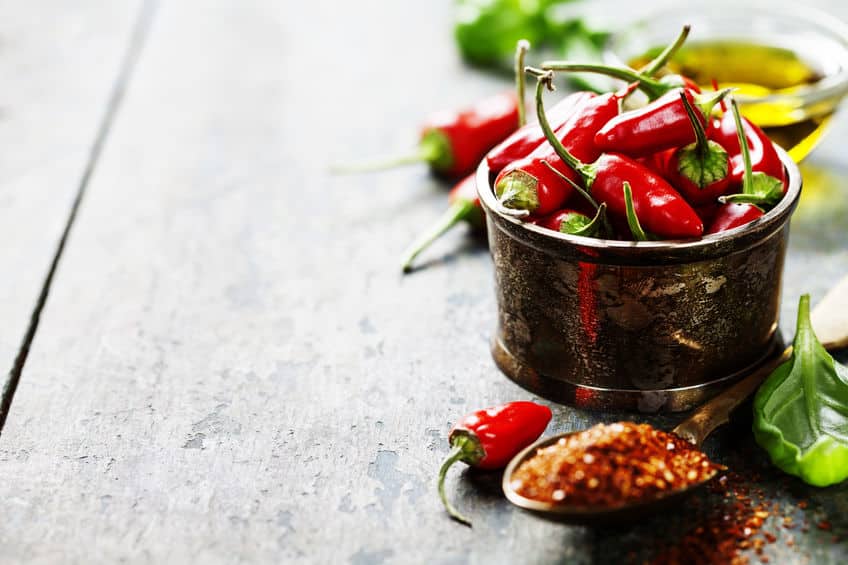By Jessica Scarpati –
The most anticipated point of each episode of Hot Ones — a YouTube series where celebrities are interviewed while eating progressively hotter chicken wings — comes when a guest bites into a spicy wing coated in Da’ Bomb, a habanero-based sauce that makes even the most fearless foodies spit fire (and usually profanities). Scarlett Johansson panicked and began doing laps around the table after taking a bite. The spicy sauce made Idris Elba start uncontrollably coughing, panting and sweating. Gordon Ramsey immediately chugged a cup of Pepto Bismol and compared the whole experience to swallowing a “mouthful of bandages.”
Anyone who has bitten into an ultra-spicy piece of food can relate. You feel like you might be dying. But it turns out just the opposite might be true, according to a recent study that found that people who regularly eat chili peppers may live longer and may be less likely to die from heart disease or cancer.
Looking at past studies of more than 570,000 people from the United States, China, Italy and Iran, researchers from the Cleveland Clinic compared the health outcomes of people who ate chili peppers to those who rarely or never did. They discovered that individuals who consumed chili peppers were 25 percent less likely to die from any cause. Spicy food buffs also had a 26 percent lower risk of dying from cardiovascular disease and were 23 percent less likely to die from cancer.
Still, researchers caution that further study is needed. Dr. Bo Xu, who led the Cleveland Clinic study, noted that the amount and type of chili pepper consumed varied between the four sets of data they analyzed, making it unclear whether a mild jalapeño carries the same perks as a scorching hot habanero.
“The data here is very preliminary, so I wouldn’t go so far as to draw conclusions or change guideline recommendations,” Xu told the BBC. “I would say if you enjoy spicy food, continue to do that. If you’ve avoided chili pepper for the fact you don’t like pungent taste, hopefully this data is a potentially an incentive to get you to try them.”
Hot peppers’ benefits are thought to come from an ingredient called capsaicin, which gives chilis their fiery kick and has been shown to have anti-inflammatory and antioxidant properties. Researchers have also linked capsaicin to weight loss, with research suggesting it helps to curb appetite and speed up metabolism. Chili peppers have also been credited for indirect health benefits, with one study finding that people who enjoyed spicy foods ate less salt and had lower blood pressure — lowering their risk of heart attack and stroke.
Before you too fired up, though, health experts note that context — as in, how you consume spicy food — is everything.
“This isn’t an excuse to go out and eat 24 wings and then rationalize it by claiming they are going to make you live longer,” food scientist John E. Hayes said in an interview with CNN. “When you’re looking at a whole food versus the individual component, we have to be very cautious.”
While some people shy away from spicy foods due to the belief that they can cause ulcers, Chicago-based gastroenterologist Dr. Ed McDonald says there’s neither smoke nor fire behind that misconception.
“As a gastroenterologist, I diagnose people with ulcers all the time. When I tell someone they have an ulcer after a procedure, almost everyone is quick to blame spicy foods. People frequently ignore the fact they are taking ibuprofen ‘around the clock’ or that they may have a bacteria called H. pylori (one of the world’s most common causes of ulcers),” McDonald writes on his blog. “Contrary to popular belief, multiple studies show that capsaicin actually inhibits acid production in the stomach. As a matter of fact, people have looked into using capsaicin as a medication for preventing ulcer development in people who take non-steroidal anti-inflammatory drugs.”
Consuming spicy foods does carry some risks, though. They can trigger symptoms for people with irritable bowel syndrome/disorder, anal fissures and incontinence. Preparing spicy food also requires caution in the kitchen, as touching your eye after handling chili peppers can cause significant burning and discomfort (capsaicin is the key ingredient in pepper spray, after all).
But here’s a hot take that should come as good news: No matter how fiercely that fire is burning in your mouth, spicy foods can’t permanently scorch off your taste buds.
“Even if you eat Scotch Bonnet, which is the hottest of the hot, and damage your taste buds, they regenerate fairly quickly,” Dana Hunnes, a senior dietitian and professor at UCLA, told the Today show.
If you’re feeling the burn in a bad way, keep your cool and reach for a glass of milk. Just don’t go for the fat-free variety, Hunnes says. It’s the fat molecules that bind to capsaicin and tame the heat.













